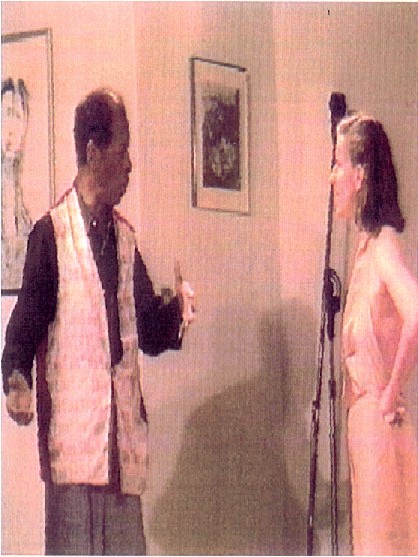ORNETTE COLEMAN: BIOGRAPHY

ORNETTE COLEMAN
P.O. Box 1189, Triboro Station, New York, NY 10035 USA
BUSINESS PHONE: 1-212-831-7738
dcharmolodic@earthlink.net
BIOGRAPHY
Born in Fort Worth, Texas, in 1930, Ornette Coleman bought his first saxophone
at age 14 with his own money. Self-taught, he was soon earning a living playing
in local rhythm and blues bands. At 19, he left home to tour with a traveling
minstrel show. Additional gigs brought him to Los Angeles.
Self-taught did not mean "isolated." A gifted imitator, he
quickly learned all the latest riffs and tunes and was particularly taken by
Be-bop's revolutionary innovation of improvising on chord changes. Coleman soon
moved beyond the constrictions of this invention, but as he began to play the
new possibilities he felt and heard, others shunned him and his music.
Undaunted, he continued to teach himself, studying composition
between floors while working as an elevator operator. Ornette took on younger
musicians who "wood-shedded" with him while waiting for others to hear what
they could play.
Recognition finally came, though not without controversy, in
the late fifties, at the Five Spot in Greenwich Village and with such prophetically-titled
albums as "Something
Else", "Tomorrow
is the Question", and "The
Shape of Jazz To Come". Coleman made the "collective improvisations" of
what came to be called "free jazz" the latest and, to many, the last in the
long line of innovations stretching from King
Oliver, Louis Armstrong,
and Duke Ellington
to Charlie
Parker.
Yet Coleman was primarily concerned not in introducing a new
"style" but in encouraging individual and collective expression through an expansion
of musical possibilities. At the height of his popularity, he withdrew to teach
himself violin and trumpet. Chamber works and symphonies followed that earned
him praise from Gunther
Schuller, Leonard
Bernstein, and Virgil
Thompson, as well as favorable comparisons to Charles
Ives and John
Cage.
Coleman continues on the cutting edge of jazz. He was named
Downbeat
and Rolling Stone
Jazz Musician of the Year in 1987. Prime
Time, his electrified ensemble created in the mid-1970s with his son Denardo
on drums, has served as a progenitor for subsequent punk, funk, and fusion experiments.
Its central intuition - that all musicians can "solo" at once and together -
carried the Phil Spector "wall of sound" concept into the fourth dimension.
And his recent work with his "New Quartet" brought the acoustic piano sound
(of Geri
Allen) back into his jazz performances for the first time since Paul
Bley stayed behind on the West Coast when Coleman headed East to the Five
Spot with Don
Cherry, accompanied by Charlie Haden and Billy
Higgins.
Ornette has also become a sought-after and innovative composer
of considerable stature, commissioned by the Brooklyn
Academy of Music, Paris's Festival
d'Automne, and Milan's La
Scala, for whom he is preparing an opera.
His original approach to music, "Harmolodics"
- which gives equal value to harmony, motion (or rhythm), and melody and allows
any musician to make a contribution to the music on any of these levels at any
time - has earned him recognition as a "genius" with the awarding of the 1994
MacArthur
Prize. In the summer of 1997 he was crowned with laurels at two separate
festivals honoring his lifelong work: La
Villette Jazz Festival in Paris and the Lincoln
Center Festival in New York City, where the New
York Philharmonic performed his Skies
of America symphony.
Following an acclaimed performance of his chamber music at
the Museum of Modern Art,
Coleman opened the 2000
Bell Atlantic Jazz Festival in Battery Park with a full range of his jazz
and classical compositions.

